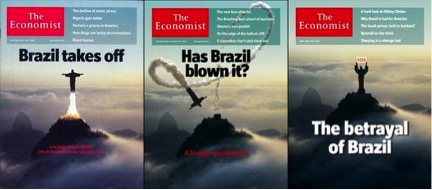A foundation leader once approached me proposing that we invite Bill Gates to launch the Giving Pledge in Brazil. I told him that the Pledge implied the donation of the majority of a person’s or couple’s wealth, and that I thought that there would be few if any wealthy Brazilians that would be up for this. The foundation director then asked me: ‘Couldn’t we negotiate a smaller donation, something like 10 or 20 per cent of the person’s wealth?’
Being at the time the secretary general of GIFE, around 2012, I was amused: how could we, a rather small group of foundations in Brazil, propose a change to the Giving Pledge precept? Anyway, we did try to contact the initiative in the US, but were told that our country wasn’t a priority at that moment.
This episode led me to some insights on Brazilian wealth and how it operates – similar to the reflections I had reading PSJP’s Philanthropy in Brazil report. On the one hand, we do not have that many people that consider themselves wealthy enough to donate more than half of their patrimony – actually, there has been one, up to now. Real estate mogul Elie Horn and his wife Susy signed the Giving Pledge in December 2015. Of the Forbes 2018 list of 42 billionaires in Brazil, 30 have less than US$3 billion. It’s a huge amount of money for any human being, but it pales compared to the wealth of many of the 183 signatories to the Giving Pledge. So I imagined that the idea of proposing a smaller donation might be taking into account this difference.
On the other hand, as someone who has worked all my life for social justice, I am always aware of the vast inequalities in my country. We are the third most unequal country in the world according to the 2018 OECD income inequality indicator, only behind Costa Rica and South Africa, though we are the eighth largest economy by GDP. So why shouldn’t wealthy Brazilians be willing to contribute ‘a majority of their wealth to philanthropic causes’, as proposed by the Pledge?
In The Owners of Power, one of the main classics on Brazilian political thinking, the historian Raymundo Faoro classifies Brazil as patrimonialist: one of its central traits is the blending of the public and private sectors. Power, wealth, influence and control have been blisteringly concentrated in the hands of the same few since the country was a colony of Portugal.
What happened to the ‘philanthropy boom’?
The picture revealed by the Philanthropy in Brazil report is unflattering. Putting it bluntly: a few give a little to a small number of causes. Of course, there are good practices, some of them very sophisticated, but these are mainly exceptions. Besides the historically unfavourable and unstable legal framework for non-profits, the profound political and economic crisis the country has been undergoing since 2013 has tended to exacerbate this ungiving culture.
When WINGS established its secretariat in São Paulo, around the same time that I said that we were having a ‘philanthropy boom’, Brazil was taking off on the Economist’s cover. It was one of the only major economies that had not been hard hit by the 2008 global financial meltdown. But from 2013 onwards the country derailed, its political system crashed, its economy submerged. No one knows who will be elected president in October this year – and there are some frightening alternatives. Philanthropy’s total investment has started to recede for the first time since it began to be measured by GIFE, in 2001.

Brazil: moving downward from 2009 to 2013, and beyond
In 2010, when the good phase seemed to be consolidating, GIFE launched a 2020 Vision for Social Investment. It had three central planks: 1) a relevant and legitimate social investment sector; 2) a sector covering a wide range of themes, regions and target audiences (with the emphasis on social justice); 3) a sector composed of a sustainable and diverse set of investors (with the emphasis on grantmaking).
With wealth growing rapidly in Brazil, GIFE foresaw in 2010 that by 2020 a new set of individual and family foundations and institutes could play the role of financing civil society organizations, replacing other forms of investment, such as international aid and philanthropy, which had largely moved to poorer regions of the world in the previous decade. What we had in mind was akin to the beginning of the 20th century in the US, with its emerging philanthropists such as Henry Ford and Will Keith Kellogg.
A mainly risk-averse sector
In the 2010 GIFE Census family organizations made up 3 per cent of the sample; in the 2016 GIFE Census this group had grown to 19 per cent of the 116 respondents. This was spurred by GIFE’s 2020 Vision, but it also reflects a true, quick growth in this kind of philanthropy. Nevertheless, these new organizations have tended to act like the more established corporate philanthropy organizations, which mostly operate their own programmes rather than making grants to NGOs. There are great exceptions – and the PSJP report tells some of these stories. But in general the new-born family philanthropy sector in Brazil has not by any means filled the gap left by the international foundations and aid organizations.
For almost two decades now, corporate foundations have been seeking alignment with their business sponsors. Frequently this means channelling resources to areas of interest to the business, such as its supply chain. When well done, this can produce concrete social-environmental impact, for example retailers that are protecting the Amazon by only buying and selling products that do not embed deforestation. But it can also mean less resources for philanthropy itself.
Widening the scope of Brazilian philanthropy
The Philanthropy Network for Social Justice organizations, Brazilian co-publishers of the PSJP report, therefore play a crucial role in Brazil. They widen the scope of Brazilian philanthropy by focusing on themes that are mainly avoided by the generally risk-averse corporate and family organizations, such as human rights and racial equity (here too there are really nice exceptions, also presented by the report). These mostly independent funds promote the strengthening of civil society organizations through grantmaking.
As well described by the report, Brazil does not have a well-established and recognized civil society. The political culture has been top down for most of the country’s history. Democracy is quite recent – the last dictatorship ended just over 30 years ago. The words ‘Order and Progress’ on the Brazilian flag are today part of the marketing strategy of the government that took over after the impeachment of the more left-leaning Dilma Rousseff in 2016. ‘Order’ in Brazil means a strong centralized government, controlling the executive, legislative and judiciary – as well as the economy – all at the same time.
Civil society, especially the part of it that advocates for social justice, is frequently accused of moving in the opposite direction. It is more identified with those that have historically been sidelined from the patrimonialist governance of the country. For most of the present government bureaucrats and politicians, dissent is seen as disorder.
Transforming Brazilian philanthropy from operating to grantmaking, from a focus on restricted interests towards a social justice orientation, has implications that go far beyond reaching a new ‘paradigm of giving’ in the country. It means moving tectonic structures of power and concentration of wealth that have been in place since the foundation of Brazil in 1500.
Fernando Rossetti is principal at Reos Partners, an international consultancy on systemic change. He was secretary general of GIFE from 2004 to 2013 and chair of the board of directors of WINGS from 2008 to 2012.






Comments (0)